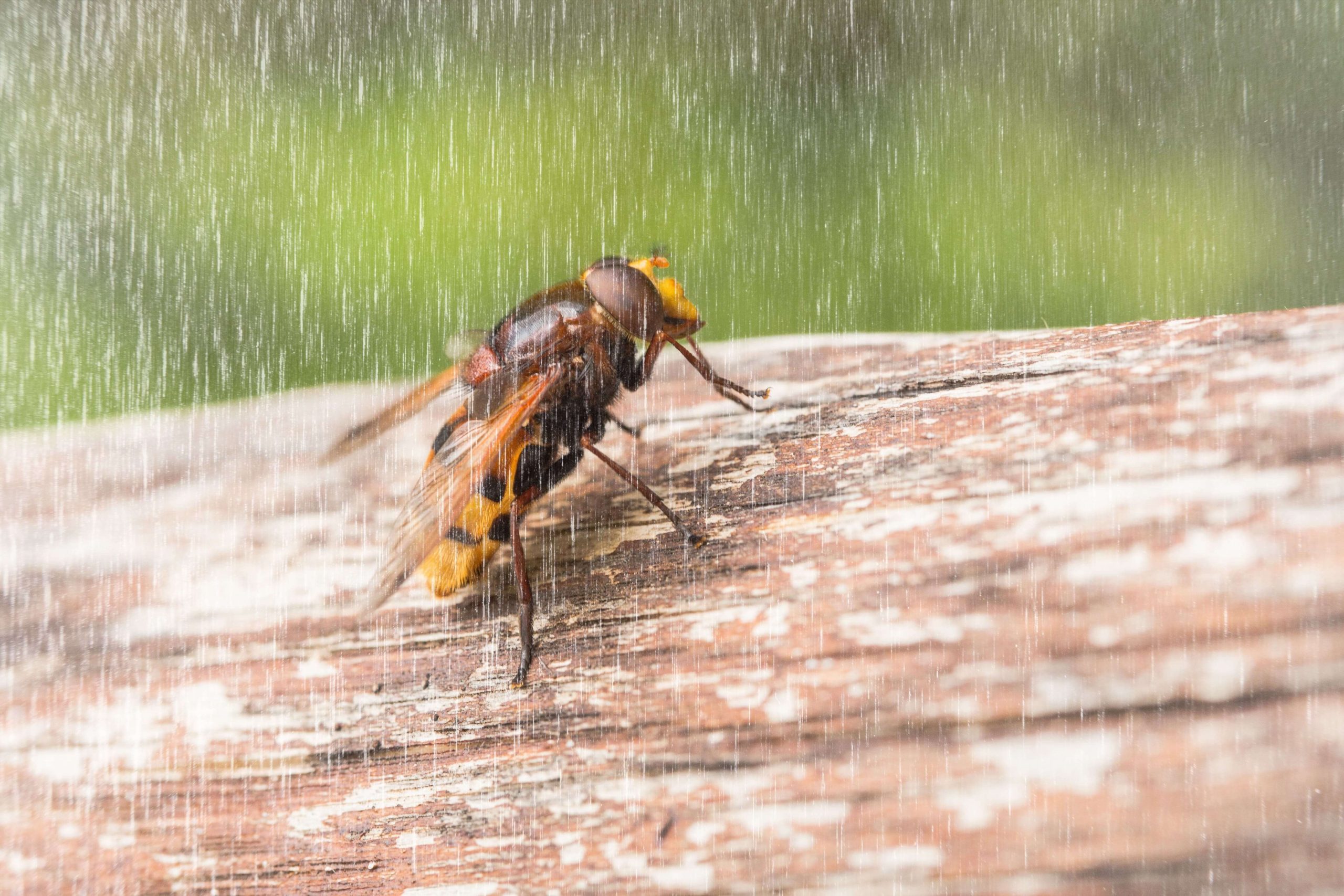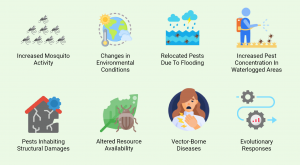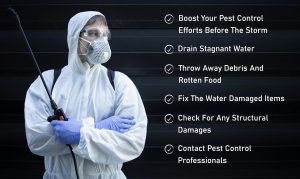Hurricanes Affect Pest Population: Here’s What To Do
Published Date: January 3, 2024

The annual Atlantic hurricane season from June to November inflicts visible havoc on coastal states like Alabama, Louisiana, Florida, and Mississippi. Natural disasters such as hurricanes profoundly influence ecosystems, reshaping landscapes and disrupting the delicate balance of biodiversity.
Beyond the immediate aftermath of destructive flooding and high-speed winds, the often-overlooked impact of hurricanes on pest populations in residential areas becomes apparent. This guide delves into the less visible consequences of hurricanes on pests, offering homeowners actionable steps to address these challenges.
How Do Hurricanes Affect Pest Populations?
Hurricanes, characterized by their powerful winds, torrential rains, and storm surges, create a cascade of effects reverberating through ecosystems. While the focus often centers on the destruction of infrastructure and displacement of human populations, the ecological aftermath remains a complex and lesser-explored aspect.

This section delves into how hurricanes can influence pest populations, examining short-term disruptions and long-term ecological adaptations.
Increased Mosquito Activity
Hurricanes can clog drains and gutters and cause localized flooding due to incessant rain. These blockages leave behind a sizable puddle of standing water, making it the perfect breeding ground for mosquitoes.
Changes in Environmental Conditions
The extreme weather associated with hurricanes, including heavy rainfall and fluctuating temperatures, can create temporary or permanent changes in local environmental conditions. Pests, especially those sensitive to temperature and moisture, may experience changes in their reproductive patterns, development, and survival rates.
Relocated Pests Due To Flooding
A flood does not clear an area of pests but may cause the pests to relocate to other areas. For instance, Fire ants form a raft-like structure until they reach drier areas, while rodents can swim and move along with the floodwaters.
Increased Pest Concentration In Waterlogged Areas
Pests are naturally drawn to moisture. Waterlogged items such as carpets, books, and furniture become attractive shelters, potentially leading pests into your home.
Pests Inhabiting Structural Damages
Flying debris, winds, and water can damage the structure of buildings and homes. Roof damage, gaps, holes, and weakened foundations can offer entryways to rodents and insects. This is the best time for them to find new spots to nest within your home.
Altered Resource Availability
Hurricanes can change the availability of food sources and breeding sites for pests. The destruction of plant material and the creation of standing water, for example, can impact the availability of both natural and artificial resources for pests. This, in turn, can influence their population dynamics.
Vector-Borne Diseases
Some pests serve as vectors for diseases, and hurricanes can influence the prevalence of these diseases. Standing water left after a hurricane can become breeding grounds for disease-carrying mosquitoes, potentially increasing vector-borne illnesses.
Evolutionary Responses
Pests are not static entities; they can evolve in response to environmental changes. Hurricanes may act as selective pressures, favoring traits that enhance a pest’s ability to survive and reproduce in the altered post-hurricane environment. This can lead to evolutionary changes in pest populations over time.
Which Pests Do You Have To Worry About During The Hurricane Season?
The National Pest Management Association has reported the following pests to be of the most concern during and the months after the hurricane season.
Rodents
Many rodents would be displaced during the hurricane, gathering in fallen garbage cans or construction debris.
Termites
If your neighborhood was flooded and water displaced the soil, termites can find easy entryways to your home. Even if you have a pesticide barrier, it will likely be displaced, bringing termites into your home directly. In such cases, the homes in the area must be treated for termites to avoid structural damage.
Bed Bugs
During a hurricane, many people must evacuate their homes and share clothing or furnishings with many others. Bed bugs can easily transmit when living in such close quarters. These bugs are stubborn, and getting rid of them can be quite hard.
Flies
Flies usually breed in sewage pooling from broken pipes or rotting garbage from mounds of spoiled food. The power cuts can cause the food at home to rot and invite infestation by flies.
How To Control Pests During Hurricane Season?
Controlling pests in hurricane season is crucial due to fallen trees and standing water, which attract various insects seeking refuge, often in our homes. It is essential to implement effective measures to address potential health and property risks.

The following preventive steps can aid in pest management and avoidance during the hurricane season:
Boost Your Pest Control Efforts Before The Storm
You can start by conducting exhaustive inspections inside and outside your home to find any construction issues the impending storm could worsen.
- Seal any cracks with a silicone-based caulk.
- Make sure to fix any existing water damage.
- Potential breeding grounds like mulch and garbage cans should be kept far away from the house.
Drain Stagnant Water
Stagnant water or water receptacles are preferred breeding grounds for mosquitoes. These pests need at least half an inch of water to propagate. Homeowners should tackle standing water sources like clogged gutters or drains, garbage cans, flowerpots, birdbaths, etc. Draining these water deposits can prevent the infestation of pests in your backyard.
Throw Away Debris And Rotten Food
Extended power cuts due to bad weather can cause the food in your home to spoil. Rotten food or food waste attracts flies and rodents. For this reason, it is best to discard this waste outside in a sealed trash bag.
Sanitary workers prioritize collecting trash over debris lying around. Handling these piles of debris with gloves and keeping them away from the house is advisable.
Fix The Water Damaged Items
Water-damaged wood can attract pesky termites that bite through it and quickly cause thousands of dollars worth of damage. In addition, excessive moisture can oversaturate the soil around your property, making underground insects like ants seek shelter inside your house.
Removing debris and fixing damaged water pipes can help in mitigating these threats. It’s a great idea to ensure that the property’s slopes slide away from the house to stop water from pooling around.
Check For Any Structural Damages
Rain, hail, and high winds during a hurricane can damage houses. This weather also displaces the surrounding wildlife, making bigger pests like mice, squirrels, raccoons, etc., to seek shelter in nearby homes.
Structural damages like damaged siding, soffits, and roofing can turn into entryways for these animals. Any signs of damage on the exterior or around the house should be fixed at the earliest. Sealing openings around the doors and windows with caulk or steel will act as barricades against these pests.
Contact Pest Control Professionals
It may seem easy to take precautions and combat pest infestation yourself. However, things can get out of hand during a calamity. Professionals have years of experience on their hands and have plans to handle these situations. Leaving pest control issues to the experts can bring much better results.
If you suspect a possible pest infestation in your home, you should consider calling licensed pest control professionals to your rescue. They can inspect and identify any underlying issues before they get out of hand. They also offer different types of customized treatment plans in case of a possible infestation.
Conclusion
In hurricane season, underestimated pest impacts risk to health and property. Recognizing threats, from mosquito breeding to rodents seeking shelter, empowers proactive actions. Pre-storm measures, like sealing entry points, and post-storm tasks, such as debris removal, are crucial. While individual efforts matter, top pest control companies ensure a thorough approach to safeguard homes from heightened pest challenges during hurricanes.
Frequently Asked Questions (FAQs)
Do Hurricanes Attract Specific Pests?
Yes, hurricanes can increase pests, including mosquitoes, rodents, termites, bed bugs, and flies, as they seek shelter and breeding grounds in the aftermath of storms.
How Can I Protect My Home From Pests During Hurricane Season?
You can protect your home by following these steps:
- Boosting pest control efforts before the storm
- Draining stagnant water
- Discarding debris and rotten food
- Fixing water-damaged items
- Checking for structural damages
- Seeking assistance from professional pest control companies
What Should Be Done About Standing Water After A Hurricane?
Homeowners should promptly drain standing water sources like clogged gutters, drains, garbage cans, flowerpots, birdbaths, etc., to prevent the breeding of mosquitoes and other pests.
Can I Handle Pest Control On My Own After A Hurricane?
While individual efforts are valuable, seeking professional assistance from licensed pest control professionals is advisable for a more thorough and effective approach, especially in challenging post-hurricane situations.
How Quickly Can Pest Infestations Occur After A Hurricane?
Pest infestations can occur relatively quickly, especially in the aftermath of hurricanes when standing water, damaged structures, and displaced pests create favorable conditions for rapid reproduction.




